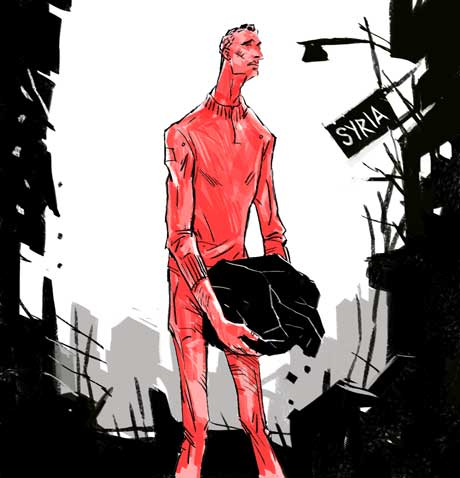Niño Jose Heredia /©Gulf News
Last week, George and Amal Clooney’s philanthropic outfit, the Clooney Foundation for Justice, announced that it was partnering with Unicef to devote $2.25 million (Dh8.27 million) to help send 3,000 Syrian refugee children to seven public schools in Lebanon. Registration starts in September. That’s a welcome band-aid from a well-meaning, not to mention socially-engaged couple.
But, seriously, what happens, years from now, when the guns fall silent, peace reigns and Syrian refugees — barring those who have opted to resettle permanently in host states that have accepted them as asylum-seekers — finally return home? Will they be able to rebuild their shattered country and live normal lives?
Not by a long stretch, for rebuilding Syria is a grand project that gets less grand as we get deeper into the specifics.
Let’s look at some staggering figures and some sobering facts. In 2016, the United Nations had identified 13.5 million Syrians as requiring humanitarian aid, of which, six million were internally displaced and around five million were driven to seek refuge outside their homeland. Think of it, that’s more than half the country’s original population of 23 million! That surely represents the fragmentation of a whole national community and the decimation of its ancestral habitat. Then toss in the painful fact that the geography of a people’s national soul is always organically anchored to its inherited acre. Severed from that acre, that ancestral sod, one feels an unbearable dissonance at one’s core.
But the statistic (the term is obscene when used in this context, given its abstraction, its hollowness) that one should pay more attention to here is the number of children who have been affected by the war and who, when it is time for them to return home, will be young adults. To say that they have, since 2011, faced a startling degree of psychological shock and witnessed astonishing brutality, would be to assert something that has already been repeated to the point of litany by observers. But that is the sad truth.
Most of these children, whether in exile or internally displaced, do not attend school — schools in Raqqa, the progressively shrinking capital of the delusional ‘caliphate’ of Daesh (the self-proclaimed Islamic State of Iraq and the Levant), as in much of Syria, have been shuttered for years — but rather endure Dickensian conditions as bread-winners, doing menial labour or putting in long hours as factotums in grocery stores, bakeries and storerooms. Call them, as they have been repeatedly called elsewhere, “Syria’s Lost Generation” — children traumatised by their experiences in blood-soaked, war-torn zones, children made to watch beheadings in Daesh-controlled town squares, children broken in back and spirit, children having to marshal the strength to carry their own pain.
A lost generation, yes, but more than that, an illiterate generation which, when its members return home as young adults, will lack the skills to contribute much to rebuilding their nation.
Under normal circumstances (consider post-war Germany and Japan), the resources of a country await only the touch of skilled labour and the infusion of capital for those resources to transform into energised wealth — both material and cultural wealth. But you need the inventive genius of workers who have attended academic institutions, such as high-schools, universities and technical colleges, to achieve that. And you need intellectual elites, worldly folks who have read avidly, mastered languages, and absorbed ideas deeply, to be at the top of the pyramid in public debate, where you engage officials and politicians, but never surrender your judgements to them.
If the larger segment of the population of a country cannot read road signs, let alone newspapers, that country will not move forward. As a case in point, look at how the average citizen in Mexico City, which has a population of nine million, lives only a tenth as well as, say, his or her counterpart in Amityville, Long Island, which is home to only 12,000 people.
To build a post-Daesh, post-civil war Syria — a country that, as we speak, is a heap of rubble, with little functioning infrastructure — returnees will have additionally to contend with whether the ethno-sectarian, hegemonic hold on the government by the unspeakably sadistic ancient regime is still in place, or whether it has been dismantled.
One thing is plain: What we call “Syria’s Lost Generation” will, by the time it makes its leap to a maturing consciousness in exile, have had its sensibility honed at the whetstone of poverty, destitution and otherness. And this condition will result in a tension-producing agent for sweeping change. The source of the energy will be derived from the generation’s teleological spirit of history — not its academic or intellectual acumen. You don’t need a formal education through which to demonstrate your humanity. That humanity has a way about it of declaring its own form of being.
Fawaz Turki is a journalist, lecturer and author based in Washington. He is the author of The Disinherited: Journal of a Palestinian Exile.









